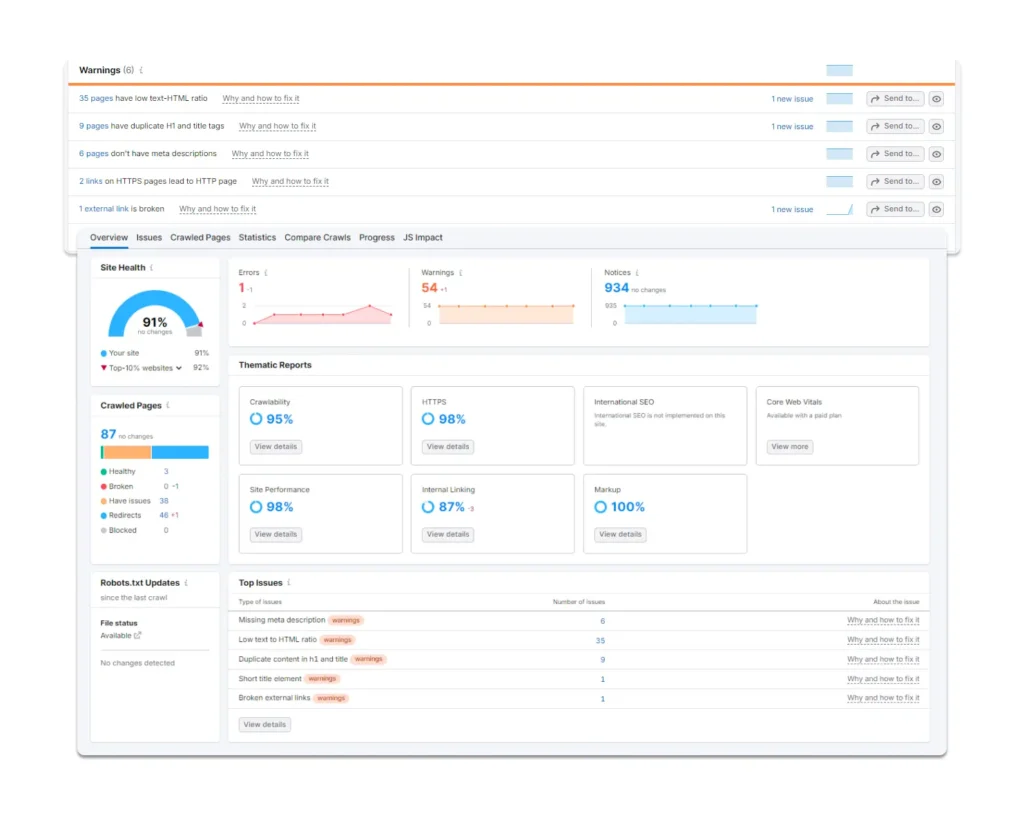Table of Contents
SEO costs in the UK typically range from £300 to £10,000 per month, depending on your industry, location, competition, and the type of SEO service required. Most small to medium-sized UK businesses invest between £600 and £2,500 per month, while highly competitive markets (particularly London-based businesses) often require higher budgets.
Based on analysis of agencies, freelancers, and in-house teams, this guide explains what SEO costs in the UK in 2026, what’s included at different price points, and how to choose an SEO budget that makes sense for your business.
📌 TL;DR: SEO Costs in The UK for 2026
If you’re looking for a quick answer, here’s what most UK businesses can expect to pay for SEO in 2026:
- Hourly Rates: £30 – £150 per hour
- Monthly SEO Packages: £300 – £10,000+ per month
- Project-Based Prices: £1,000 – £10,000+ depending on the project scope
- Productised SEO: £80 – £3,000+ depending on whether you need help with writing a blog, or an SEO audit
- Performance-Based Pricing: Typically 5% – 15% share of total revenue/profit generated during an SEO campaign
Below, I’ll break down each SEO pricing model in detail, explain who each option is best suited for, and show you how to choose an SEO budget that aligns with your UK business goals.
How much does SEO cost in the UK?

The SEO rates in UK varies between £300 and £10,000+ per month depending on your business type, niche complexity, business goals and market saturation.
There are 5 main types of SEO pricing models and I’ve conducted primary research looking at 10+ agencies and freelance platforms to determine the pricing structures so you don’t have to. Let’s dive in.
Hourly Rates
One of the most straightforward pricing models is the hourly rate, typically charged by freelancers and some agencies. This model is ideal for businesses that need specific tasks performed without committing to a long-term contract.
Typical hourly rates in the UK are £30 – £150 per hour.
Hiring an SEO per hour is ideal for:
- Businesses requiring specific SEO tasks, such as audits or keyword research, without a long-term commitment.
- Companies with smaller budgets looking to explore SEO in a more controlled manner.
- One-time consultations or short-term projects needing immediate attention.
While hourly rates provide flexibility, they can also lead to higher overall costs if multiple hours are needed to complete a project. It’s essential to clarify the expected hours upfront to avoid any surprises.
Let me give you an example:
If you hire a freelancer for an SEO audit at £75 per hour and it takes 10 hours to complete, your total cost would be £750. Whereas if you sign up for a monthly SEO package, an agency would provide an SEO audit as part of their monthly reporting. Still, if the freelancer identifies key areas for improvement that ultimately lead to increased traffic and sales, this investment may yield significant returns.

Do you want a free audit and SEO estimate for your website?
Monthly Retainers
Monthly retainers are a popular pricing model, especially among agencies. In this arrangement, businesses pay a fixed fee each month for ongoing SEO services, ensuring a consistent approach to optimisation.
Typical monthly costs in the UK: £300 – £10,000+ per month.
A monthly SEO retainer is ideal for:
- Businesses aiming for long-term SEO strategies with continuous optimisation.
- Companies in competitive markets needing sustained effort to maintain or improve rankings.
- Full-service SEO campaigns that include everything from content creation to technical audits and regular reporting.
Monthly retainers provide peace of mind, as you know what to expect and can build a long-term strategy with your provider.
Here’s an example:
A local roofing company paying £1,500 per month for a comprehensive SEO package might receive services that include keyword research, local SEO optimisation, Google Business Profile optimisation, content creation, link building, and monthly reporting. This ongoing effort leads to improved search rankings and significantly increased organic traffic over time which ultimately brings more revenue.
Project-Based Pricing
Some providers offer project-based pricing, where a flat fee is charged for specific tasks or campaigns. For example, if a business needs a thorough website audit, a technical SEO overhaul and a link-building campaign. This model is great for businesses that want to address particular needs without committing to ongoing services
Typical project costs in the UK: £1,000 – £10,000+ per project (depending on scope).
Project-based pricing is ideal for:
- Businesses needing one-off services like an SEO audit or content strategy.
- Companies that prefer a targeted approach without a long-term commitment.
- Smaller businesses testing the waters of SEO without a large financial investment.
Project-based pricing allows businesses to get the specific help they need while still maintaining budget control. Just be sure to define the project scope clearly to prevent unexpected costs.
Here’s an example:
A company seeking an SEO audit may engage a provider for a one-time fee of £2,000. The audit includes an analysis of their current website, competitor benchmarking, and a comprehensive report with actionable recommendations.
Productised SEO Services
Productised SEO services have gained traction in 2024, where specific deliverables, such as a set number of blog posts or backlinks, are offered at a flat rate. This model suits businesses that know precisely what they want and prefer straightforward pricing.
For example:
£80 – £300 for a 1,000-word SEO-optimised blog post.
£100 – £1,000 for a thorough keyword research.
£500 – £10,000 for an SEO audit.
Productised SEO services are ideal for:
- Businesses looking for specific outcomes without a retainer commitment.
- Companies needing quick results in particular areas, such as content creation or link building.
- Smaller businesses that want to scale their content output without managing multiple contracts.
Productised services can be an excellent way for businesses to access high-quality SEO services without the complexities of custom projects or ongoing contracts.
Performance-Based SEO: Pay for Results
Performance-based SEO is an innovative approach where providers are compensated based on the results they deliver, such as increased traffic or improved search rankings. This model is appealing to businesses that want to ensure they’re paying for tangible outcomes.
Typical costs: Varies significantly based on performance metrics. You can usually expect to pay between 5% – 15% of what the campaign had achieved if the agreed outcome was an increase in revenue.
Performance-based SEO services are ideal for:
- Companies hesitant to invest upfront in SEO without seeing guaranteed results.
- Businesses with clearly defined metrics and goals.
- Companies willing to share a portion of their revenue or profits in exchange for performance-driven results.
While this model can align the interests of both parties, it requires clear expectations and benchmarks to measure success effectively.
What are the types of SEO providers in the UK?

The UK market is teeming with various SEO service providers, each offering its advantages and disadvantages. I’ve provided a thorough breakdown below, based on my research, that covers all types of SEO service providers, their price ranges, pros and cons and who is the particular service provider ideal for. Understanding the types of providers available is crucial for selecting the right partner for your business needs, let’s take a look.
Large SEO Agencies: Comprehensive Solutions
Large SEO agencies are professional organisations specialising in providing extensive digital marketing services, with SEO being a core offering. These agencies usually consist of teams of experts in various fields, such as content marketing, technical SEO, and analytics, ensuring a holistic approach to search optimisation.
Here are the PROS:
- Wide Range of Services: Agencies typically offer a full suite of services, allowing for a comprehensive SEO strategy that covers all facets of optimisation, from keyword research to link building and content creation.
- Access to Expertise: With a diverse team of specialists, agencies can provide insights and strategies that are challenging to replicate with individual freelancers, ensuring a thorough and nuanced approach to SEO.
- Scalability: Agencies can adapt their offerings based on your changing needs, making them suitable for both small and large projects, as well as businesses in various growth stages.
And now the CONS:
- Higher Costs: The extensive resources and expertise typically result in higher pricing than freelancers or smaller providers.
- Less Personalised Service: With many clients to manage, some agencies may lack the personalised touch that smaller providers can offer, leading to a one-size-fits-all approach.
Who are the ideal candidates?
- Businesses with a substantial budget can invest in comprehensive SEO strategies.
- Companies aiming for significant growth and needing extensive marketing support.
- Businesses operating in highly competitive industries which require advanced strategies to gain an edge.
Small SEO Agencies: Tailored Solutions
Small SEO agencies are professional organisations that specialise in providing tailored SEO solutions to a particular niche or market segment. These agencies often consist of smaller teams of experts, usually 2-10 people handling different areas of SEO, such as local SEO, Google My Business optimisation, technical SEO, backlink building, etc.
Here are the PROS of small SEO agencies:
- Limited Amount of Clients: Smaller SEO agencies often have limited capacity and handle fewer projects at one time, meaning they provide a more personalised experience to clients and are easily approachable.
- Niche-specific: This type of SEO agencies are focusing its continuous research and development resources on a specific niche or market. They provide a more strategic approach to SEO for that particular niche/market, that cannot be offered by a large reputable SEO agency.
- Affordability: Their services are more affordable than large SEO agencies. For example, we at The Nurtur provide SEO only to trades, services and small businesses and our monthly SEO packages start at £599 p/m including a comprehensive SEO audit, whereas a reputable agency would charge £1000+ just for an SEO audit. Here you can find out more about our SEO services.
And now the CONS of small SEO agencies:
- Limited Availability: Due to the limited capacity you might be required to join a waitlist to be able to hire a small SEO agency. If they are good at SEO for your niche or market it might be worth the wait.
- Limited Range Of Services: Smaller SEO agencies often focus specifically on SEO and might not be able to provide supplementary services such as social media management, video editing, or PPC campaigns whereas larger SEO agencies could be able to accommodate that.
Who are the ideal candidates?
- Local and small businesses with low to medium budgets looking to kickstart their digital marketing.
- Businesses aiming for significant growth and needing niche-specific or market-specific knowledge and experience.
- Businesses operating in highly competitive industries requiring tailored and advanced strategies to outperform competitors.
Freelancers: Cost-Effective Option
Freelancers are independent SEO professionals who often specialise in specific aspects of SEO, such as keyword research, content creation, or link building. They are an excellent choice for small businesses or startups looking for cost-effective solutions.
PROS of working with a freelancer:
- Affordability: Freelancers usually charge lower rates than agencies, making them a more accessible option for smaller budgets, particularly for startups and local businesses.
- Flexibility: You can hire freelancers for specific tasks without committing to long-term contracts, allowing you to adapt your strategy as needed.
- Direct Communication: Working directly with a freelancer can lead to a more tailored service since they can focus solely on your needs and preferences, resulting in better alignment with your business goals.
CONS of working with a freelancer:
- Limited Resources: A freelancer may not provide the full range of services that an agency can offer, particularly for larger projects requiring multiple areas of expertise.
- Quality Variability: The level of expertise and professionalism can vary significantly among freelancers, necessitating careful vetting and possibly trial and error in finding the right fit for your business.
Ideal candidates for freelancers:
- Small businesses or startups needing specific services on a limited budget.
- Companies seeking a more personalised approach and willing to invest time in finding the right individual.
- Businesses testing the waters of SEO before committing to larger projects.
In-House Teams: Complete Control
For larger companies, developing an in-house SEO team can provide the most control over their optimisation strategy. This approach allows businesses to have dedicated professionals focused solely on their SEO efforts.
The PROS of hiring an In-House team:
- Direct Oversight: An in-house team allows for direct management and oversight of SEO activities and strategies, facilitating quicker adjustments and enhancements as needed.
- In-Depth Brand Knowledge: These teams have a better understanding of the brand’s voice, goals, and audience, leading to more cohesive and effective strategies.
- Quick Collaboration: Having the team on-site allows for faster decision-making and fluid communication, essential for agile marketing practices.
The CONS of hiring an In-House team:
- High Overhead Costs: Hiring a full team involves significant costs related to salaries, training, and benefits, which can be challenging for smaller companies.
- Skill Gaps: It may be difficult to find individuals who possess all the necessary skills across the diverse aspects of SEO, necessitating ongoing training or hiring specialists.
Hiring an In-House SEO team is ideal for:
- Larger companies with substantial marketing budgets that can invest in developing a dedicated team.
- Businesses with long-term SEO goals requiring consistent, high-quality output.
- Companies in competitive sectors needing quick adaptations to their strategies based on real-time data.
To conclude
When considering your SEO needs, assess your business goals, budget, and the level of expertise required. For example, if you run a local business and want to be more involved in your SEO, a freelancer may suffice. However, if you operate in a highly competitive market and need a comprehensive strategy, an agency or in-house team may be more appropriate.

Do you want a free audit and SEO estimate for your website?
How to budget for SEO?
Knowing the costs associated with SEO is crucial for effective budgeting. It’s important to note that prices differ from one provider to another. Even if you look at 10 different SEO agencies, they might charge different monthly retainers for the same campaign goals. Here, I’ll look at the two main price buckets and the average costs based on the scope of services offered.
Price bucket 1: Budget of £300 – £600 per month
The lower end of the pricing spectrum can provide basic SEO services for businesses with limited budgets, particularly startups and local businesses.
What to expect:
- Limited keyword research and on-page optimisation.
- Basic local SEO services for improving visibility in local search results.
- Minimal content creation and backlink building.
Price bucket 1 is ideal for startups, local businesses, and those testing the waters of SEO with a limited financial commitment. For instance, a local plumbing business may invest £450 – £600 per month for a basic SEO package that includes local directory submissions and basic keyword research to improve visibility in local search results.
Price bucket 2: Budget of £600 – £10,000+ per month
The higher end of the spectrum can expect a more comprehensive range of services, which may include advanced keyword research, content creation, technical SEO audits, and ongoing analysis.
What to expect:
- Comprehensive SEO strategies that include on-page, off-page, and technical SEO.
- Content marketing efforts, including blog creation, social media integration, and outreach.
- Regular reporting and analysis to measure performance and adjust strategies accordingly.
Price bucket 2 is mostly used by established businesses looking to maintain or grow their market share, particularly in competitive industries. For example, a local roofing business might invest £2,500 per month in a comprehensive strategy, including ongoing blog writing and link-building campaigns which are one of the most expensive parts of SEO.
The Importance of SEO ROI and How to Calculate it
Understanding the potential return on investment (ROI) of your SEO efforts is crucial for justifying your budget. I’ve outlined below how to estimate your SEO ROI effectively. Feel free to use our SEO ROI calculator for trades and service businesses.
1. Set Clear Objectives
Before diving into calculations, define what you want to achieve through SEO. Common objectives include increasing website traffic, generating more leads, or enhancing brand awareness.
2. Know Your Average Revenue Per Customer
Determine the average revenue each potential customer brings to your business. For example, if your average order value is £200 and your closure rate is 30%, your average revenue per lead is £60. This means for every 100 leads, you have a revenue of £6000 which is generated by the 30% of leads that converted. This is more relevant to PPC campaigns because it helps you justify what you spend per lead, but I thought it would be helpful to you.
3. Estimate Leads from SEO Efforts
Utilising analytics tools, project how much additional traffic your SEO strategies could bring. For instance, if your goal is to increase website traffic by 3,000 visitors monthly and you anticipate a 5% conversion rate, you could expect around 150 new leads.
4. Calculate Potential Revenue
Multiply the number of leads by your average revenue per lead. For example, if you generate 150 leads at £60 each, your potential revenue would be £9,000.
5. Assess Your SEO Investment
Finally, subtract your monthly SEO costs from the estimated revenue to calculate your ROI. If your monthly SEO investment is £800 and your estimated revenue is £9,000, your ROI would be £8,200. This positive return indicates a successful SEO strategy.
6. Consider Long-Term Benefits
SEO is not just about immediate gains; it’s also about long-term value. While your initial ROI calculations may show modest returns, successful SEO strategies often yield compounding benefits resulting in increased traffic, brand loyalty, and customer acquisition over time. The leads generated might not convert straight away, but they become part of your ecosystem and can be targeted at a later stage with coupons, discounts and more.
Conclusion: How Much Does SEO Cost UK?
Smaller businesses may find that a budget of £300 to £600 per month meets their basic SEO needs, particularly for local optimisation. Larger companies or those in highly competitive sectors may need to invest £600 to £10,000+ per month for comprehensive strategies.
Regardless of your budget, remember to view SEO as a long-term investment. Sustainable growth usually stems from a well-structured and consistently executed SEO strategy rather than chasing quick wins.
With the right approach and a commitment to ongoing optimisation, businesses can expect substantial returns on their SEO investments over time.
FAQs about SEO Costs in the UK
The main factors that influence SEO prices in the UK are the scope of work, industry competition, goals, niche complexity, geographical focus and the type of SEO provider you choose.
SEO is primarily an ongoing investment rather than a one-time cost. The main point is to establish a sustainable long-term revenue stream for your business. While you may pay for specific services, the nature of SEO requires continuous effort to maintain and improve search rankings.
SEO is a long-term strategy, and results can take time to materialise. Typically, businesses may start seeing initial improvements within 3 to 6 months. However, significant changes in rankings, traffic, and conversions often take 6 to 12 months or longer.
While most providers will outline their services and costs upfront, hidden costs can arise. To avoid surprises, always clarify what’s included in the contract and ask about potential extra costs before signing. My recommendation is to never agree to work with someone who wants to charge extra for tools and software or revisions if you are going for a monthly SEO service. Everything that the SEO specialist will do, should be included in the price already.
Yes, businesses can implement basic SEO strategies on their own, especially for smaller sites or local businesses. There are many free resources, courses, and tools available online to help you get started. For example, I started a cleaning business 3 years ago and optimised my SEO. Within 12 months I not only ranked several articles in the top 5 positions on Google, I also generated 200+ leads.









